Wix vs WordPress: Which One Should You Choose To Build A Website?
- Category : Development
- Posted on : Sep 16, 2018
- Views : 3,274
- By : Naftali P.
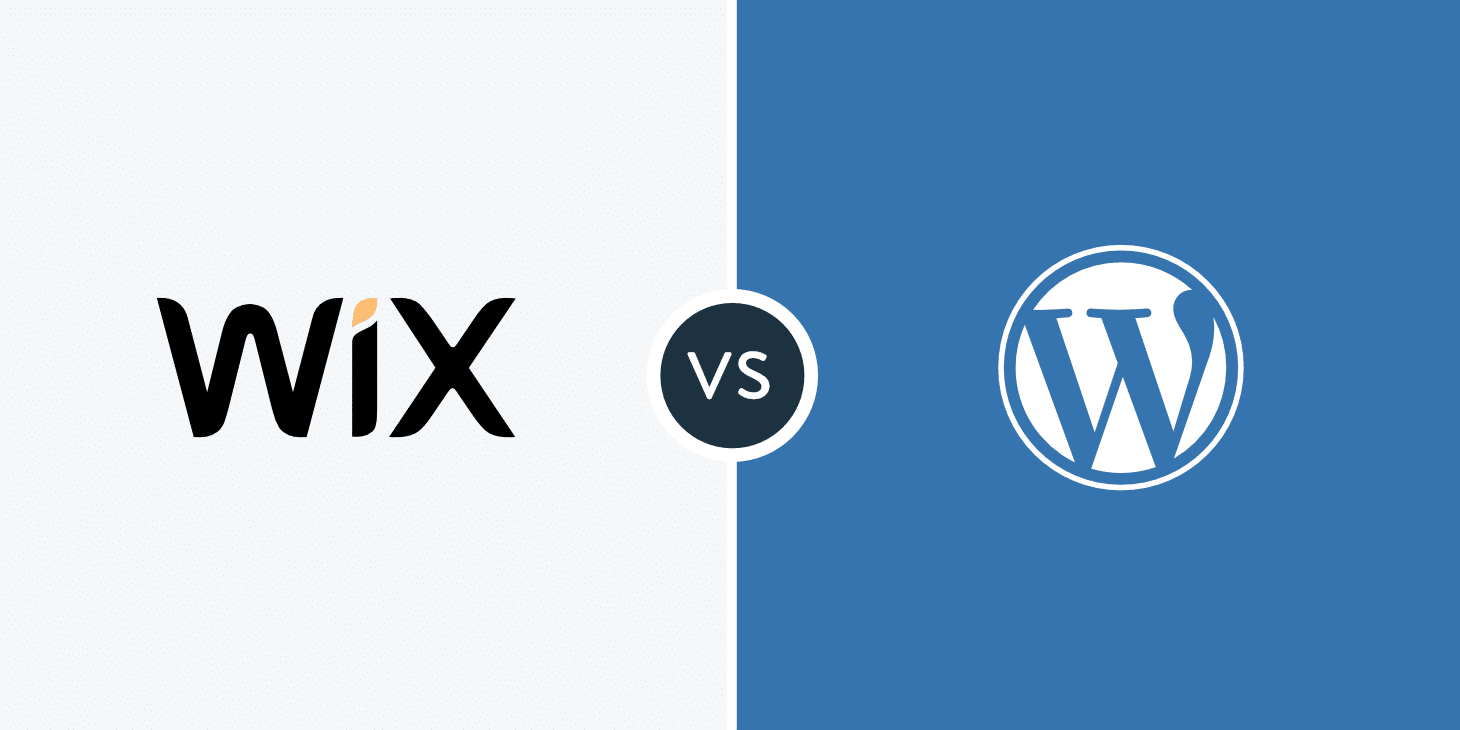
When it comes to building a website, we’re pretty strong proponents of WordPress (the fact that we specialize in WordPress hosting might give that away). But despite powering a whopping 33% of the world’s websites, WordPress isn’t the only way for you to make a website.
In this post, we’ll dig into Wix, a popular hosted website builder, and compare Wix vs WordPress. If you caught our Squarespace vs WordPress comparison, we’re going to follow an identical format to that post so that you can easily compare all three platforms.
If all goes well, by the end of this post you should know which of these two platforms is the best solution to build your website.
Are you looking to switch from Wix to WordPress? Click here for our step by step tutorial: How to Migrate from Wix to WordPress (Complete Guide)
Wix vs WordPress: A Quick Overview
We’ll get into some more detailed Wix vs WordPress comparisons in a second, but before we get too much into the specific details, let’s discuss the basic philosophy that each solution brings to the table. Just as with Squarespace and WordPress, at a fundamental level Wix vs WordPress comes down to a balancing act between two concepts:
- Simplicity and accessibility to beginners – that is, how easy it is for someone who isn’t a developer to create a functioning, aesthetic website.
- Flexibility and ease of customization – that is, how easy is it for someone to customize a website to make it do exactly what they want it to do.
Wix made the decision to sacrifice some flexibility in order to create a site building experience that makes it easy for even beginners to create a functioning website. WordPress, on the other hand, sacrifices a little bit of user-friendliness in order to give you the ability to customize 100% of your website.
Beyond those core differences, there are also some other notable differences that we’ll cover in more detail like:
- Data ownership
- Website maintenance
- Price
How Easy Is It To Build A Website On Each Platform?
In terms of how easy it is to quickly create a website that looks great, Wix is the winner. Wix isn’t as flexible after you build that basic website, but it is a great solution for quickly churning out a simple, aesthetic website.
WordPress is still fairly easy – but you will need to jump through some hoops when it comes to hosting your website, and it’s a little bit more complicated to get your site set up.
Wix
Here’s how easy it is to create a website with Wix: First, you sign up. Then, you choose what type of website you want to create:
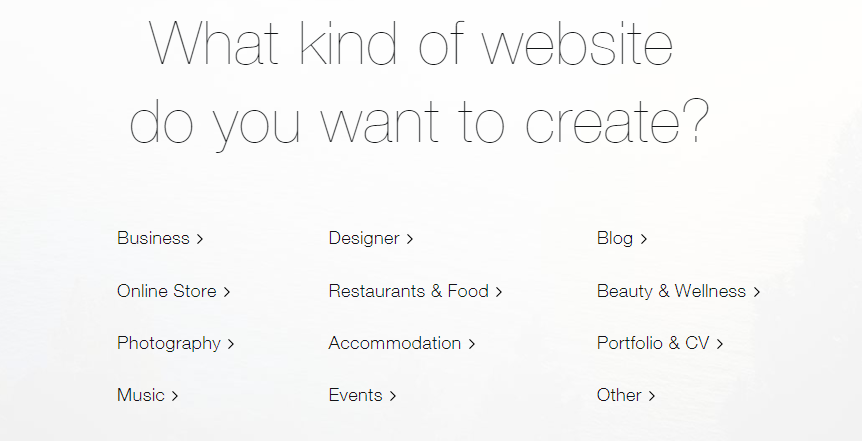
We’ll choose a Restaurant website for this example. Once you choose your type, you can select from all the relevant templates:

And once you choose your template, you’re dumped straight into the Wix Editor where you can easily change text, images, and more:
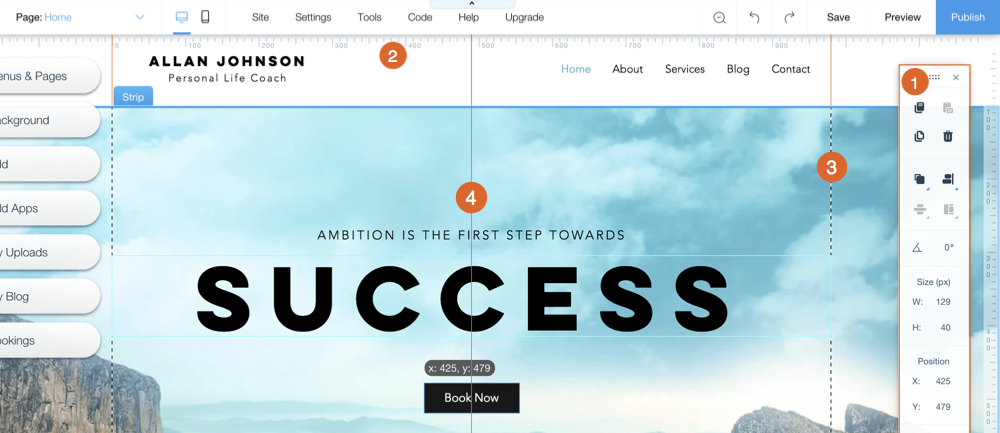
And once you’re done, all you do is click Publish to make your website live.
The whole process is simple and undeniably easy for beginners….assuming you like Wix’s pre-built templates and don’t want to customize things too much.
WordPress
Whereas with Wix you can sign up and start editing your site right away, WordPress requires a few preliminary steps.
Before you can get started, you’ll need to sign up for web hosting and get your own domain name. While that is an added step, most hosts nowadays make the process pretty painless – so you’re probably only adding about 5-10 minutes to getting started.
Once you install WordPress (or have your host install WordPress for you), you’re ready to choose a “theme” to control how your site looks:
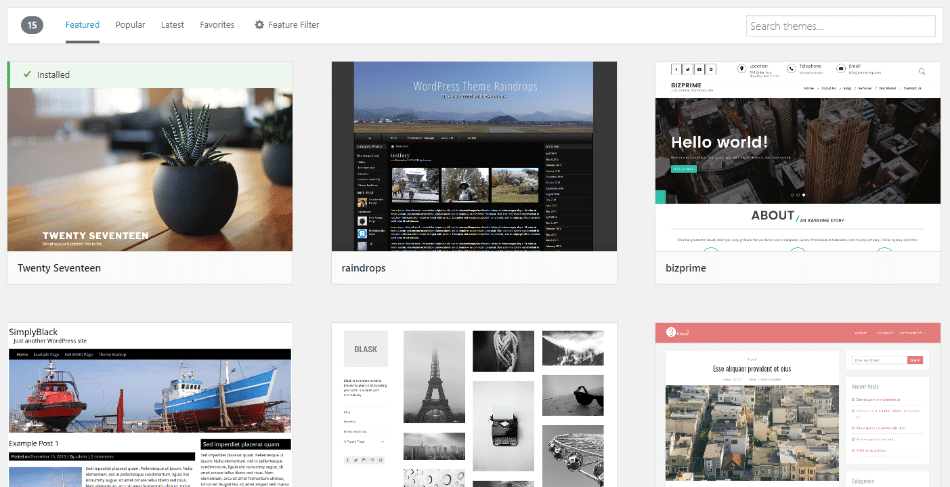
You can find both free and paid themes, and some themes also include something called “demo” content so that, much like Wix, you just need to edit the pre-filled content, rather than creating your site from scratch.
While WordPress isn’t as simple as Wix, it’s still fairly easy for a non-developer to create a functional, aesthetic website using WordPress.
How Much Control Do You Have Over Your Website’s Functionality?
Whereas Wix won when it came to ease of use, WordPress knocks things out of the park when it comes to flexibility and customizations.
Wix
If you want to add functionality to your Wix site, you’ll be mostly relying on the Wix App Market:
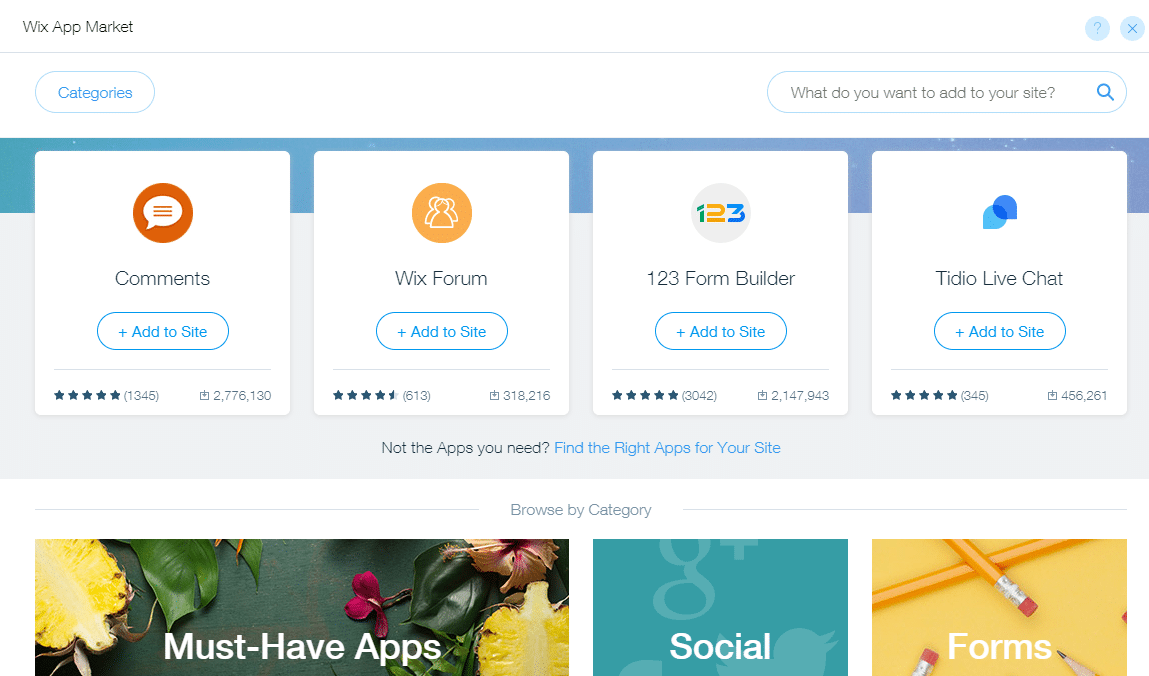
This app market gives you more flexibility than something like Squarespace but still doesn’t come close to covering all of the things that you can do with WordPress.
Currently, the Wix App Market only has 288 apps in total. As you’ll see in a second, that pales in comparison to WordPress.
Beyond that, you’re also severely limited when it comes to making your own code tweaks (or having a developer make code tweaks for you).
Wix does sort of allow you to add custom code, but only in a “sandboxed iFrame” with a number of restrictions.
WordPress
With WordPress, you have far more flexibility on both fronts.
First off, let’s start with plugins. WordPress plugins let you add new functionality or tweak existing functionality without needing to know any code. Currently, WordPress has over 53,000 different free plugins that you can install, with thousands more premium plugins.
Want to integrate social media into your site? Use a social media plugin. Same with advertising management, contact forms, quizzes, and pretty much any other functionality you can think up.
And if you want to build all of your content with the ease of use of the Wix Editor, you can use one of the many page builder plugins:
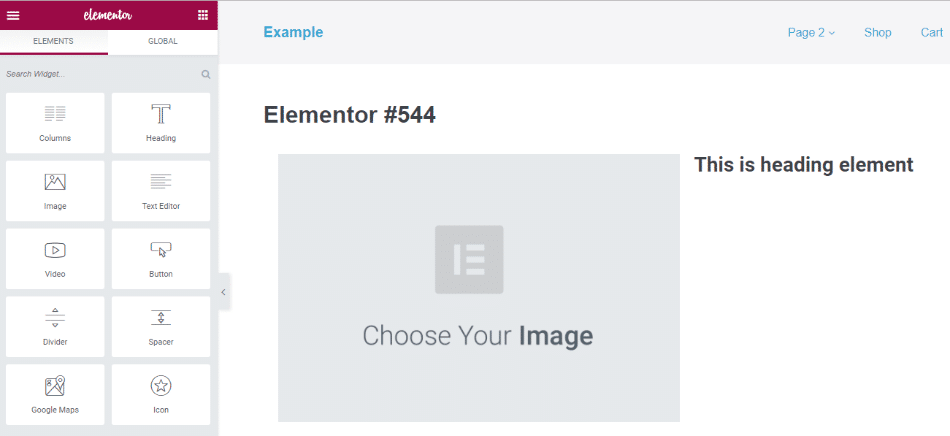
Beyond that, you (or a developer) are free to add any custom code to your website, which gives you even more flexibility. Unlike Wix, you don’t have to contend with any code limitations.
How Does Each Platform Handle eCommerce?
Wix does offer eCommerce functionality, but it’s not as flexible as what you can do with something like WooCommerce or Easy Digital Downloads on WordPress.
Wix
With Wix, you can either choose from a pre-built online store template or add the store app to an existing template. For example, in the screenshot below, we’ve added the store app to our popular Host SEO Pizza Shop page:
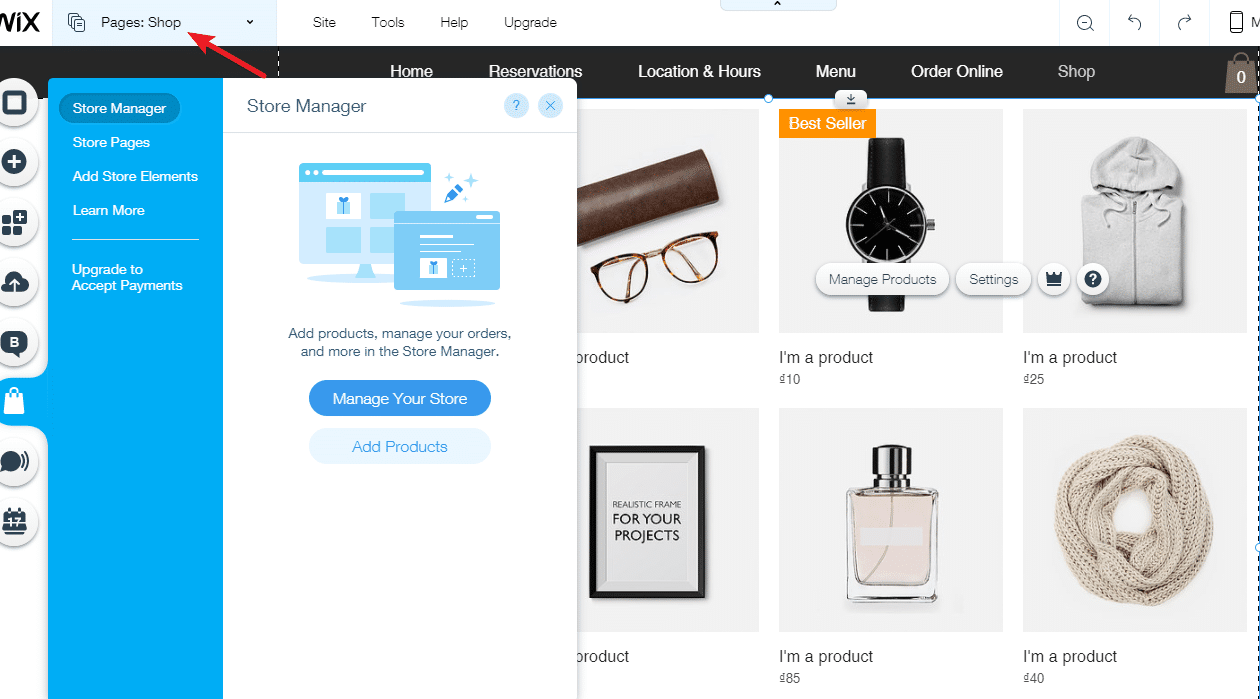
You can then add products and manage your store via a popup interface:
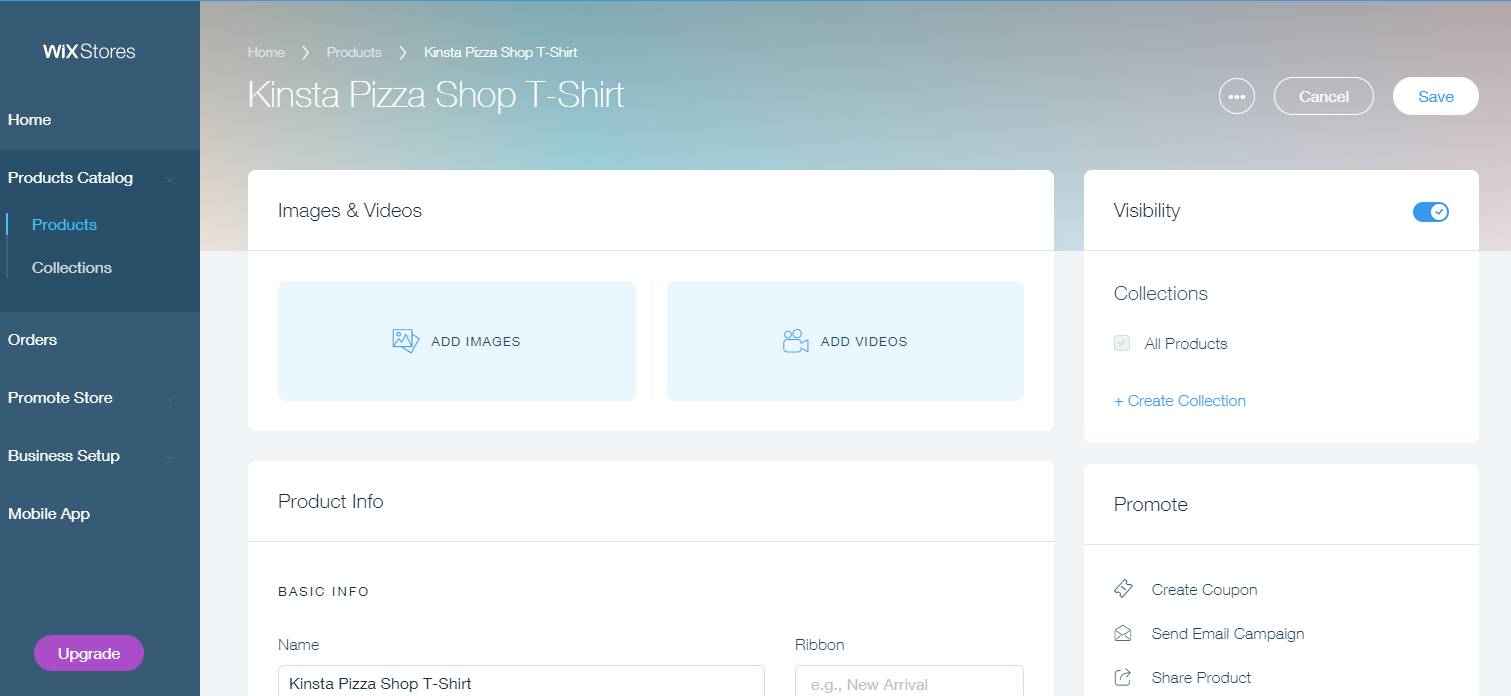
It’s fine for simple products – but beyond simple text fields, you again lack the flexibility to truly dig in and customize your product information.
If you’re just selling a t-shirt – Wix is probably fine. But for variable or customized products, you’ll probably wish you had more flexibility.
Finally, Wix’ eCommerce functionality is only available on their special Store plans, which cost a bit more than a regular Wix site.
WordPress
While WordPress is primarily known as a website builder platform, it’s actually the dominant eCommerce platform as well, with WooCommerce accounting for 42% (a plurality) of all eCommerce sites.
With WordPress, you’ll need to turn to a plugin to add eCommerce functionality, though. The two most common options are:
- WooCommerce – mainly focused on physical products
- Easy Digital Downloads – mainly focused on virtual products
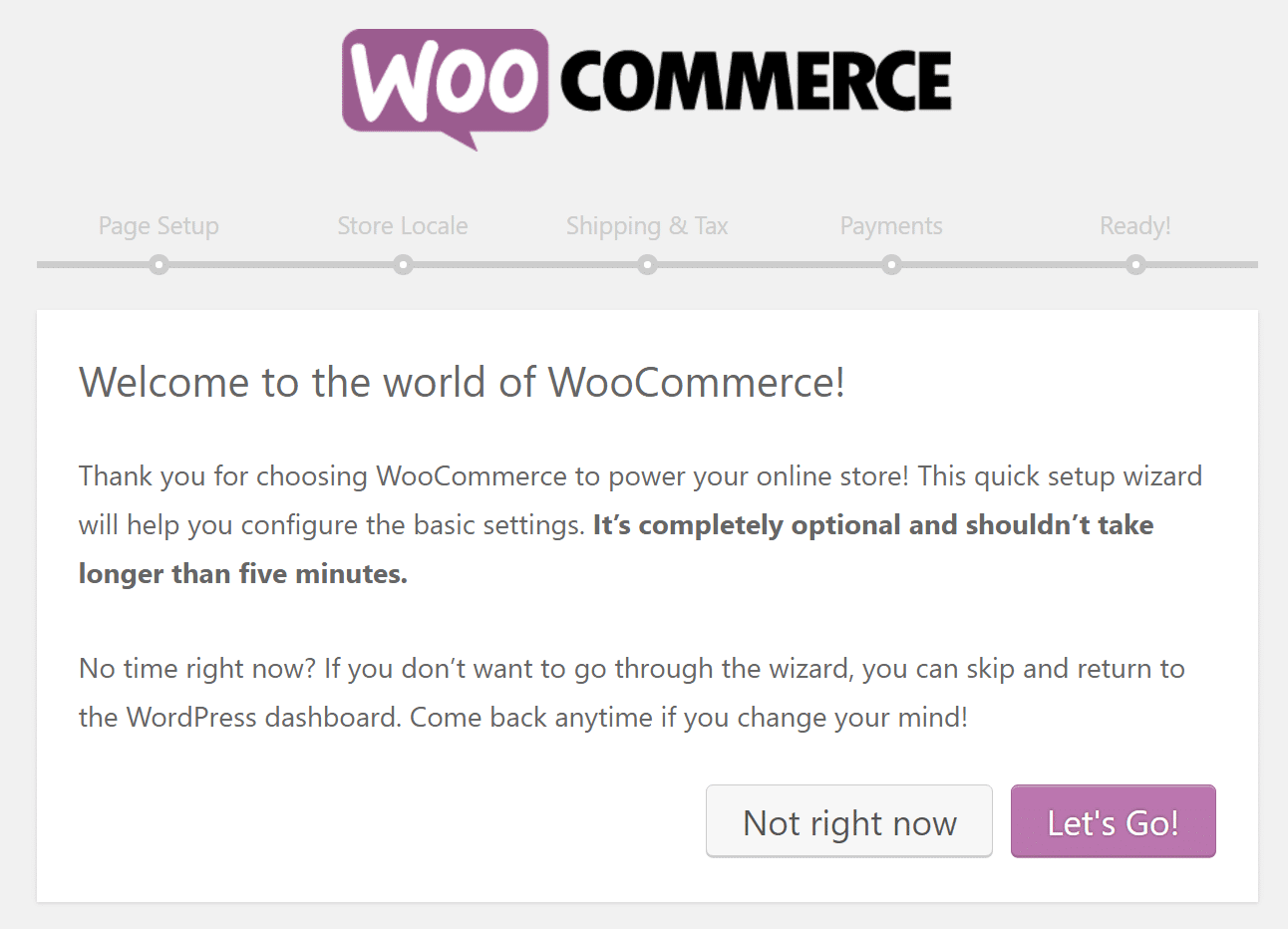
Along with each base eCommerce plugin, you can also find huge marketplaces of add-on plugins to extend your store even further. Just like with regular WordPress sites, this gives you a ton of flexibility for how you display products, handle fulfillment, and lots more.
For example, you can even find plugins that sync WooCommerce with a print on demand service so that you can outsource order fulfillment to someone else.
That level of flexibility is why WordPress is usually a much better platform to create an eCommerce store.
Who Controls Your Data On Each Platform?
While in the short-term it may not be a major consideration for beginners, data ownership should be a major factor in your final decision. By data ownership, we mean things like:
- Can you download a copy of your content?
- Can you easily move your content to another website builder?
With respect to data ownership, WordPress is the clear winner. It’s not even close.
Wix
In case you’re wondering why we say it’s not even close, here’s Wix’s statement on data ownership, straight
So…yeah. That should be a pretty big red flag if you’re concerned with data ownership.
While there are some third-party tools that offer workarounds to, say, migrate Wix to WordPress, Wix doesn’t give you an easy way to do this by yourself.
WordPress
With WordPress, you’re always in full control of all your data. You can download, export, or manipulate 100% of the data on your site because you control everything.
Like we said – it’s not even close.
How Does Each Platform Handle Ongoing Maintenance?
While Wix’s closed ecosystem isn’t great for data ownership or flexibility, the major benefit is that it virtually eliminates the need for you to handle maintenance and security.
With WordPress, you’ll either need to handle these things yourself or find a managed WordPress host such as Host SEO with an emphasis on security and maintenance.
Wix
This section is short because you don’t need to do anything with Wix – Wix does it all for you. You never need to worry about updates or security vulnerabilities.
WordPress
Things are the opposite with WordPress. That is, you’re in charge of things like:
- Security
- Updating software
- Backing up your data
That doesn’t necessarily mean you need to do those things yourself, though. You always have options like:
- Using backup and security plugins
- Choosing a managed WordPress host
- Hiring a WordPress maintenance service
How Much Does Each Platform Cost?
Wix offers simple, monthly pricing so that you always know exactly how much you’ll pay. With WordPress, things are a little trickier. As to which is cheaper, though, there’s no right answer. In general, a WordPress site will probably be cheaper in the long term, though (because of Wix’s flat monthly billing).
Wix
Wix has two sets of monthly plans, depending on whether or not you’re planning to have an eCommerce store. Here’s the pricing for regular Wix sites:
Your Wix site and all of its content is hosted exclusively on Wix’s servers, and cannot be transferred elsewhere.
Specifically, it is not possible to export or embed files, pages or sites, created using the Wix Editor or ADI, to another external destination or host.
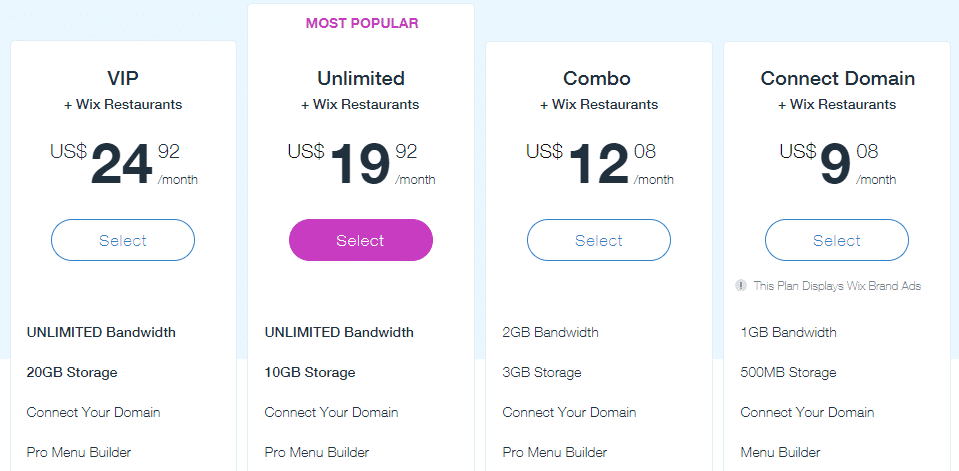
And here’s the pricing for Wix eCommerce stores:
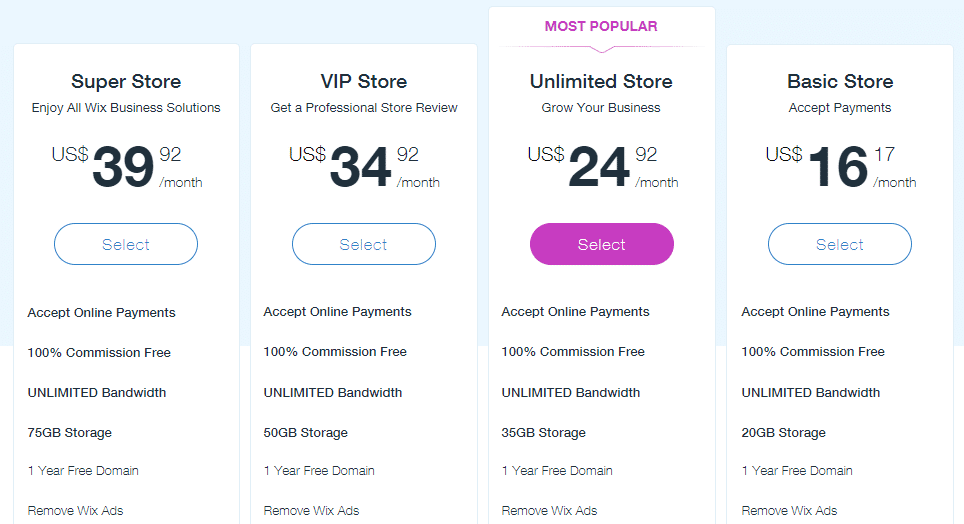
There’s also a free Wix plan, but you can’t use your own domain names and it displays Wix ads.
WordPress
With WordPress, there are only two unavoidable fixed costs:
- Hosting – cheap shared hosting can be as little as $50 per year, while quality managed WordPress hosts usually run at least ~$30 per month.
- Domain name – typically $10 per year.
Beyond that, you might also want to purchase some premium themes and/or plugins. These are not necessary to run a WordPress site, but often have better functionality, support, and/or designs.
Is One or the Other Better for SEO?
This is a very controversial topic with many, as some will argue that Wix is better for SEO, while others that WordPress is. However, if we strip both of them back, neither of them are that different when it comes to the fundamentals of on-page SEO. Both include the following:
- Ability to change page titles, meta descriptions, and H1-H6 tags
- Sitemaps can be generated for faster and easier crawling
- You can add alt tags to images on both platforms
- Friendly and short URLs are standard
- Mobile-friendy
- You can connect to Google Search Console, Bing Webmaster Tools, Google Analytics, etc.
As far as off-page SEO goes, a backlink or social signal doesn’t really care what type of platform you are on. The one area that we would say that WordPress does excel in this area is the ability to have more control over both the speed of your site and advanced options for indexing/crawling/blocking. These can directly impact SEO and rankings.
The important thing when it comes to SEO is really to focus not so much on the platform but rather on the quality of content you’re publishing, promotion on social media, and backlinks you’re building.
Wix vs WordPress: Which One Should You Choose?
Our recommendation here is going to feel fairly similar to the conclusion of our WordPress and Squarespace post (because Wix is similar to Squarespace in a number of ways).
If you just want an easy way to create a basic website and aren’t concerned with complete data ownership or the flexibility to customize your site, then Wix is probably a fine solution. Just remember – if you decide you want more flexibility later on down the road, it’s going to be a pain to migrate your site from Wix.
For most users, WordPress is probably the best solution, though. Here’s why:
- While it’s not as beginner friendly, it’s still easy for most beginners to grasp, and the WordPress community keeps making it even easier.
- You have much more flexibility when it comes to adding functionality to your website because of WordPress’ massive plugin ecosystem.
- You’re always fully in control of your data and have complete control/ownership.
Now it’s over to you guys – given that this blog is primarily about WordPress, we have a good guess where you might fall on the Wix vs WordPress spectrum. But still, we’d love to hear your thoughts!
Categories
- cPanel Question 47
- cPanel Software Management 29
- cPanel Tutorials 13
- Development 29
- Domain 13
- General 19
- Linux Helpline (Easy Guide) 156
- Marketing 47
- MySQL Question 13
- News 2
- PHP Configuration 14
- SEO 4
- SEO 42
- Server Administration 84
- SSL Installation 54
- Tips and Tricks 24
- VPS 3
- Web Hosting 44
- Website Security 22
- WHM questions 13
- WordPress 148
Subscribe Now
10,000 successful online businessmen like to have our content directly delivered to their inbox. Subscribe to our newsletter!Archive Calendar
| Sat | Sun | Mon | Tue | Wed | Thu | Fri |
|---|---|---|---|---|---|---|
| 1 | 2 | 3 | 4 | |||
| 5 | 6 | 7 | 8 | 9 | 10 | 11 |
| 12 | 13 | 14 | 15 | 16 | 17 | 18 |
| 19 | 20 | 21 | 22 | 23 | 24 | 25 |
| 26 | 27 | 28 | 29 | 30 | 31 | |
Recent Articles
-

Posted on : Sep 17
-

Posted on : Sep 10
-

Posted on : Aug 04
-

Posted on : Apr 01
Tags
- ts
- myisam
- vpn
- sql
- process
- kill
- tweak
- server load
- attack
- ddos mitigation
- Knowledge
- layer 7
- ddos
- webmail
- DMARC
- Development
- nginx
- seo vpn
- Hosting Security
- wireguard
- innodb
- exim
- smtp relay
- smtp
- VPS Hosting
- cpulimit
- Plesk
- Comparison
- cpu
- encryption
- WHM
- xampp
- sysstat
- optimize
- cheap vpn
- php-fpm
- mariadb
- apache
- Small Business
- Error
- Networking
- VPS
- SSD Hosting
- Link Building
- centos
- DNS
- optimization
- ubuntu







